- Home
- Robert Muchamore
One Shot Kill
One Shot Kill Read online
www.hodderchildrens.co.uk
BY ROBERT MUCHAMORE
The Henderson’s Boys series:
1. The Escape
2. Eagle Day
3. Secret Army
4. Grey Wolves
5. The Prisoner
6. One Shot Kill
… and coming soon:
7. Scorched Earth
The CHERUB series:
1. The Recruit
2. Class A
3. Maximum Security
4. The Killing
5. Divine Madness
6. Man vs Beast
7. The Fall
8. Mad Dogs
9. The Sleepwalker
10. The General
11. Brigands M.C.
12. Shadow Wave
CHERUB series 2:
1. People’s Republic
2. Guardian Angel
… and coming soon:
3. Black Friday
Copyright © 2012 Robert Muchamore
First published in Great Britain in 2012
by Hodder Children’s Books
This ebook edition published in 2012
The right of Robert Muchamore to be identified as the Author of the Work has been asserted by him in accordance with the Copyright, Designs and Patents Act 1988.
All rights reserved. Apart from any use permitted under UK copyright law, this publication may only be reproduced, stored or transmitted, in any form, or by any means with prior permission in writing from the publishers or in the case of reprographic production in accordance with the terms of licences issued by the Copyright Licensing Agency and may not be otherwise circulated in any form of binding or cover other than that in which it is published and without a similar condition being imposed on the subsequent purchaser.
All characters in this publication are fictitious and any resemblance to real persons, living or dead, is purely coincidental.
A Catalogue record for this book is available from the British Library
ISBN-13: 978 1 444 91407 8
Hodder Children’s Books
A Division of Hachette Children’s Books
338 Euston Road
London NW1 3BH
An Hachette UK company
www.hachette.co.uk
www.hodderchildrens.co.uk
www.franklinwatts.co.uk
www.orchardbooks.co.uk
www.waylandbooks.co.uk
Part One
16 May 1943–1 June 1943
By mid-1943, World War Two was turning in the Allies’ favour. Hitler’s armies had been knocked out of Africa, faced devastating setbacks in the eastern war with Russia and increasingly ferocious air raids by British and American bombers.
But Hitler still thought Germany could triumph. He believed that the alliance between Russia and the United States would be short lived and told his people that new and revolutionary German ‘Victory’ weapons would change the course of the war.
CHAPTER ONE
Fat Patty was a four-engined B-17 bomber, crewed by Americans, but assigned to a Royal Air Force special operations squadron. She’d been in the air for four hours, heading for France’s Atlantic coast. There were three men in the cockpit. Seven more manned electronic equipment and gun turrets, plus two trained spies ready to parachute into one of the most secure areas of occupied France.
Fat Patty’s crew were old hands. They’d dodged night fighters and anti-aircraft guns to insert agents deep in German territory and even made top-secret runs, dropping supplies to partisan groups in eastern Europe and refuelling in Russia before returning the following night.
Tonight’s run was as easy as this work got. After takeoff they’d flown down over Cornwall, then in a gentle southwards arc over the Atlantic, where no German fighter dared probe. The agents were to be dropped in countryside, a few kilometres from the port town of Lorient and its heavily fortified U-Boat1 base.
Dale was the radio operator, but the crew called him Old Boy because at thirty-five he was ten years older than his pilot, and the rest were even younger. He rubbed gloved hands, pulled his headphone cup away from one ear and gave the girl squatting on her parachute a few metres away a big show of pearly white teeth.
‘Gets damned cold up here,’ Dale said, shouting above four propellers and a whoosh of air. ‘Got a flask of coffee if you feel the need.’
The view down the metal-ribbed fuselage was gloomy. The only light came off illuminated dials and chinks of moonlight through the gun turret up front.
‘If I drink too much I’ll have to pee,’ Rosie Clarke replied.
The closest thing to a toilet on board was a relief tube built into the fuselage, but even when it wasn’t frozen up there was no dignified way a girl could use it.
‘Better give it a miss then,’ Dale said, smiling. ‘How old are you? Seventeen? Eighteen?’
At sixteen, Rosie was young enough to be flattered when someone said she looked older. But while Dale seemed nice, she wondered if his question was a trick that would cause trouble when she got back to campus.
‘I’d better not answer,’ Rosie said. ‘You know, security and everything.’
Dale nodded. He’d dropped enough agents to stop wondering what happened to them, but Rosie might stick in his head because she reminded him of his daughter. Rosie was nervous and kept the conversation going to help her mind settle.
‘Where are you from?’ she asked.
‘Garfield County, Utah,’ Dale said, before making a little laugh. ‘I’ll bet you’ve never heard of that.’
As Rosie nodded her stomach plunged. The pilot had pulled the bomber into a sudden upwards lurch and she had to put her hand against the floor to stop herself tipping over. They’d been skimming at two hundred feet to avoid German radar, but now they had to gain height to get a visual on their drop zone.
The two agents were to be met by a reception committee from the local resistance, who were supposed to switch on a battery-powered light beacon when they heard Fat Patty approach. Rosie’s fellow agent Eugene came eagerly down the steps from the cockpit, crouching to save his head.
Eugene was a twenty-one-year-old communist who’d run the anti-Nazi resistance around Lorient for almost two years. He’d been picked for the job by Rosie’s commanding officer Charles Henderson and by most accounts he’d built a superb team of locals to gather intelligence and sabotage the town’s heavily fortified submarine bunkers.
While the combat gear they wore draped awkwardly from Rosie’s curves, Eugene’s thick frame had been made for it. He was moderately handsome, but sharply angled eyebrows and slicked-back hair gave him a vampirish quality.
‘How are we doing?’ Rosie asked, in French.
‘Just waiting for the beacon,’ Eugene replied. ‘I wanted to see the terrain from the cockpit myself. Last time I parachuted in, the navigator mistook the landing beacon for a German searchlight and I ended up walking twenty kilometres.’
Eugene had travelled to Britain to brief his superiors, learn the latest espionage techniques and most importantly to take a break from the mental pressure of working in Nazi-occupied territory.
For Rosie, this would be her first drop since completing parachute training two years earlier. After landing, her role was to serve as a back-up radio operator, and to train some of the younger members of Eugene’s circuit.
‘Take a step back, sweetheart,’ Dale said, as he removed his headset and stood up.
After squeezing past Rosie, Dale moved towards the rear of the plane and crouched over a hatch in the floor. Moments later a red bulb illuminated directly above his head.
‘Beacon in clear view, commence drop in sixty seconds,’ the pilot announced over an intercom.
The message sent everyone scrambling. Rosie and Eug
ene strapped on parachutes they’d been sitting on for most of their journey, then helped each other attach cumbersome equipment packs that buckled to their thighs. More supplies for the local resistance would follow on additional parachutes and the nose gunner had left his position to help Dale push them out.
‘Twenty seconds. Wind north-by-north-east at two feet per second,’ the intercom said.
Rosie glanced at Eugene, feeling like she was about to spew. ‘I can’t remember the winds. Is that blowing me left or right?’
‘Gently left,’ Eugene said. ‘You’re first. Remember your breathing. Get up by the hatch.’
As the red bulb died and the green next to it flicked on, Dale tugged on a rope handle and lifted a half-metre-square hatch out of the floor. Air currents ripped noisily towards the rear as buffeting made the fuselage shudder.
Eugene gave Rosie a friendly whack on the back as he attached the static line hanging off her chute to a bar over the hatch.
‘Drop positions,’ Dale shouted.
The bomber flew at two hundred metres, going as slow as it could without stalling. But that was still over a hundred and fifty kilometres per hour, which meant every second moved Rosie’s drop zone by forty metres.
She sat on the edge of the hatch, boots dangling over a black abyss and tense hands resting against the side. She looked up, catching angst on Dale’s face. Eugene said something, but she’d pushed off before she understood it. She fell for two seconds before the static line tethering her to the plane snapped off, opening her chute.
The crack was reassuring. It’s tough to judge the approaching ground in darkness, but if the pilot had got the height right, Rosie would be able to count to fourteen elephants before touching down. She saw the outline of a hill, but no sign of the landing beacon. As her chute opened she heard the crack of Eugene’s line, followed by three more chutes loaded with equipment. At the same time, Fat Patty began a lazy turn, dropping back beneath German radar as she turned back out towards the Atlantic.
Rosie counted under her breath, ‘Nine elephants, ten elephants, eleven elephants …’
The dark made it hard to see the ground, but a torch beam hit Rosie and after a second’s blindness she sighted trees coming up way too fast. On twelve elephants she yanked her left steering line, opening a vent in the top of the chute and tilting her sharply to the right.
A whiff of manure hit Rosie’s nostrils as she got clear sight of where she was about to land. She’d cleared the trees, but there was a tall fence closer than she’d have liked and her boot thumped into it before she pulled up her trailing leg and made a gentle touchdown on its far side.
Two torch beams lit her up, casting shadows across her body in the shape of fence posts. She unbuckled the chute and scrambled forwards, ready to gather up the billowing chute before the next gust of wind caught it. She could see the other chutes landing nearby and then she heard a shout – in German.
Heart in mouth, Rosie rolled on to her bum and got her first proper look at the men behind the torches. Her eyes had adjusted to the gloom and it was hard staring into the torch beams, but the curved outline of two German army helmets was unmistakeable.
Notes
1 U-Boat – German submarines were usually called U-Boats. The term is an abbreviation of the German word Unterseeboot, meaning submarine.
CHAPTER TWO
Lorient Gestapo headquarters was situated in a Roman-style villa, commandeered from one of the town’s wealthiest residents. Obersturmfuhrer Huber sat at a desk in a sparsely furnished interrogation room. A second desk was meant for a typist to take notes, but it was one in the morning and nobody was available.
Huber was chubby, dressed in a grey civilian suit with a fancy pocket watch hung off a gold chain. He studied his nails uninterestedly as a uniformed guard dragged a girl into the room. She was around fourteen years old, extremely thin and dressed in grubby knickers and a blood-stained man’s vest that almost reached her knees. Her eyes were badly swollen and she had dozens of burns and bruises.
‘Still defiant?’ Huber asked, watching the girl struggle as the guard forced her into a chair. ‘Edith Mercier, we’ve not had the pleasure of meeting before.’
Edith looked up, as the guard lurked behind, ready to strike. She’d not been in this interrogation room before, but they all had the same dim ceiling bulb and tang of bleach.
‘Communist bitch spat in my face,’ the guard explained. ‘Earned herself a slap for her trouble.’
‘Oh, Edith! Spitting isn’t nice,’ Huber said, smiling slightly. ‘I just need you to answer some questions. Once that’s done you can clean up. I’ll find you something to eat and better sleeping arrangements.’
Edith’s eyes were black marbles as she stared right through him.
‘Where does the stubborn attitude get you?’ Huber asked. ‘You’re just a girl. You’re facing no serious punishment, but unless you wish to suffer more than you have already, you simply must give full details of the resistance scum you’ve become mixed up with.’
Edith kept silent as Huber signalled the guard with a raised eyebrow. She felt a hand clap the back of her skull as the guard thrust forwards and banged her forehead against the desk.
‘Again,’ Huber said.
Edith was dazed as the guard slammed her a second time. She twisted, slipping off the chair and stumbling sideways, but the guard pulled the skinny girl back into the chair and clamped a hand around a neck barely wider than his wrist.
‘Where is Alois Clement?’ Huber shouted, as Edith choked. ‘When did you last see him?’
Edith gasped when the guard let go, but gave no answer. As punishment the guard snatched her wrist and twisted it agonisingly behind her back.
‘This is all so unnecessary,’ Huber said, as he shook his head gently. ‘So, so unnecessary.’
‘I don’t know anything,’ Edith shouted, when the pain became too much. ‘I’ve never heard of anyone named Clement.’
Huber pulled a notebook out of his pocket and spun it across the desktop. ‘You were carrying this with you when you were arrested.’
‘Never seen it in my life,’ Edith snarled.
‘We’ve confirmed it’s your writing. I know it’s a coded list of names. I know you worked as a messenger for Eugene Bernard and witnesses tell me you regularly visited Alois Clement at the fishing port.
‘Your witnesses are lying,’ Edith shouted. ‘You can’t trust traitors.’
Huber leaned forwards. ‘You’ll tell me everything you know, or I’ll make this the longest night of your life.’
‘You’re not even original,’ Edith laughed. ‘My last interrogator used that exact line. He got nothing from me and neither will you.’
‘Who are you trying to save?’ Huber asked. ‘I’ve been in this room with many of your friends, Edith. They’re happy to spill the beans, so why endanger your life by protecting them?’
Edith snorted. ‘If you already know so much, why are you up in the middle of the night asking me questions? Why aren’t you at home in bed, with your teddy?’
Huber was a professional interrogator, but didn’t completely succeed in hiding his irritation. Edith knew she’d scored a small victory.
In Huber’s experience the majority of people broke quickly under torture, often within minutes. About one third had the will power to hold out for a day or two, usually in order to allow a colleague or loved one to escape capture. Less than one suspect in fifty could endure pain as Edith had done.
‘You were not a blood relative of Madame Brigitte Mercier?’ Huber asked, picking a gentler tone as he signalled for the guard to back off. ‘She was your guardian, yes?’
Edith had been through enough interrogations to know that her tormentor had changed tack to try winning her confidence. This bought her recovery time, so she always played along whilst being careful not to lose concentration and say something of value.
‘I never knew my parents,’ Edith explained. ‘Madame Mercier adopted me when I was
a toddler.’
‘You worked for her?’
‘I looked after her stables and ran errands for the girls who worked in her brothels.’
Huber nodded, trying to show some empathy. ‘Sounds as if she was more like a boss than a mother. Having no real family must have been tough for you.’
‘She treated me better than a state orphanage would have done,’ Edith answered. ‘At least until one of your goons snuffed her out in one of these torture chambers.’
‘Madame Mercier’s death was not intentional,’ Huber said. ‘She suffered a heart failure while under routine interrogation.’
‘Bad news for you,’ Edith said. ‘She knew more than anyone.’
Huber bristled. He’d have liked to watch the guard bounce Edith off a couple of walls, but decided to have one last attempt at making an emotional connection.
‘You lived at the stable, with Madame Mercier’s horses?’
Edith was annoyed by the inference that Madame Mercier hadn’t cared about her. ‘And I suppose I’ll do fine now I’ve got the Gestapo looking out for me?’
Huber rubbed his eye and took a moment to think up a response. ‘Where are the horses now?’
This was something Edith didn’t like to think about. She resented the fact that Huber had found a weak spot and failed to hide the lump in her throat.
‘A little bird told me that it was an horrific moment for you,’ Huber said, as Edith wondered who’d been talking about her. ‘Your beloved horses burned to death, following a British bombing raid. You must have been devastated.’
Edith had run the stable for years and the death of the horses in a firestorm after a bombing raid had affected her more than anything, including Madame Mercier’s death.
Huber looked at the guard, speaking gently as a tear left a salty track down Edith’s cheek. ‘Fetch her some hot coffee, and a bowl of hot water for her to wash with.’
The guard seemed surprised. ‘Are you sure, sir? She might try something. She bit Thorwald’s wrist so deeply that you could see the tendons.’

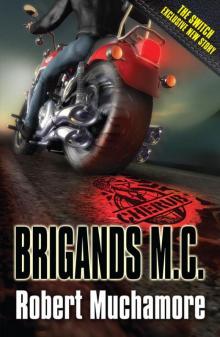 Brigands M.C.
Brigands M.C. Home
Home The General
The General New Guard
New Guard Lone Wolf
Lone Wolf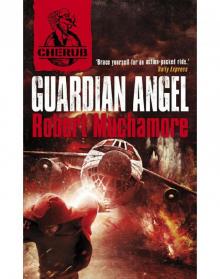 Cherub: Guardian Angel: Book 14
Cherub: Guardian Angel: Book 14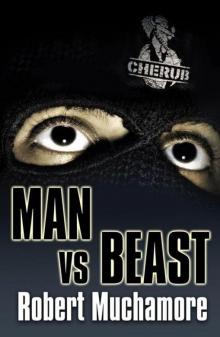 Man vs. Beast
Man vs. Beast The Escape
The Escape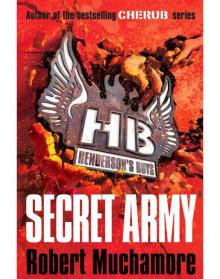 Secret Army
Secret Army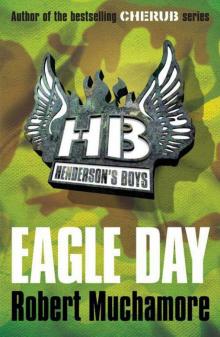 Henderson's Boys: Eagle Day: Book 2
Henderson's Boys: Eagle Day: Book 2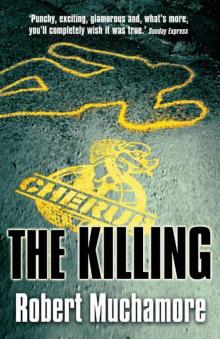 The Killing
The Killing Divine Madness
Divine Madness Class A
Class A The Sleepwalker
The Sleepwalker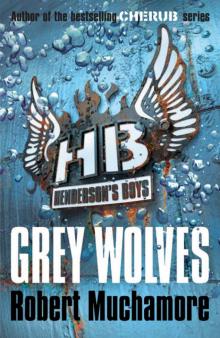 Henderson's Boys: Grey Wolves
Henderson's Boys: Grey Wolves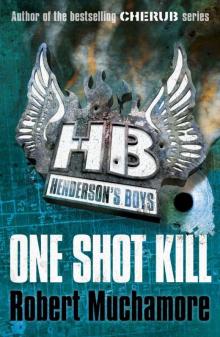 Henderson's Boys: One Shot Kill: One Shot Kill
Henderson's Boys: One Shot Kill: One Shot Kill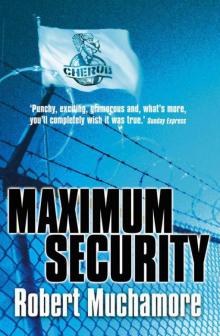 Maximum Security
Maximum Security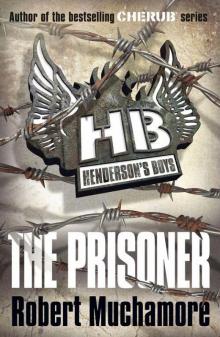 The Prisoner
The Prisoner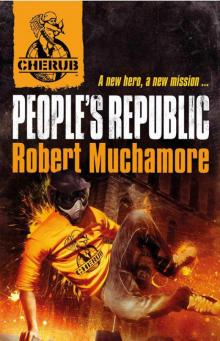 People's Republic
People's Republic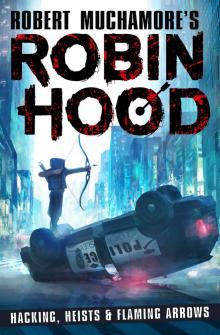 Robin Hood: Hacking, Heists and Flaming Arrows
Robin Hood: Hacking, Heists and Flaming Arrows Shadow Wave
Shadow Wave Mad Dogs
Mad Dogs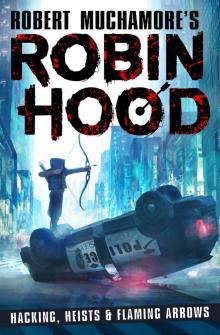 Robin Hood
Robin Hood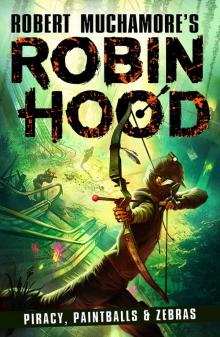 Robin Hood 2
Robin Hood 2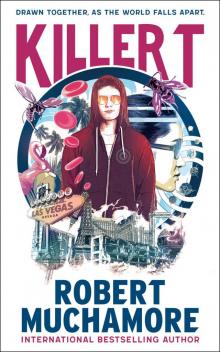 KILLER T
KILLER T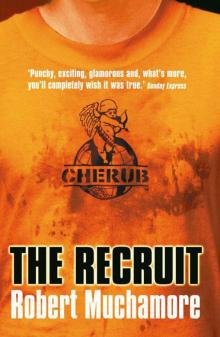 The Recruit
The Recruit Henderson's Boys: Scorched Earth
Henderson's Boys: Scorched Earth The Fall
The Fall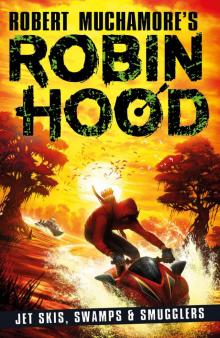 Jet Skis, Swamps & Smugglers
Jet Skis, Swamps & Smugglers Black Friday
Black Friday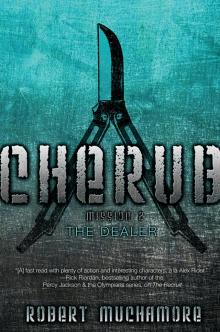 The Dealer
The Dealer CHERUB: Mad Dogs
CHERUB: Mad Dogs Scorched Earth
Scorched Earth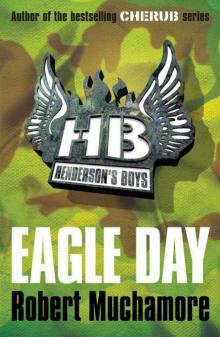 Henderson's Boys: Eagle Day
Henderson's Boys: Eagle Day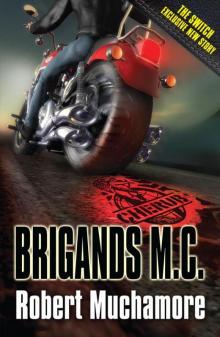 CHERUB: Brigands M.C.
CHERUB: Brigands M.C.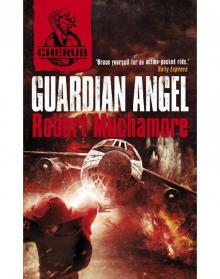 CHERUB: Guardian Angel
CHERUB: Guardian Angel CHERUB: The Sleepwalker
CHERUB: The Sleepwalker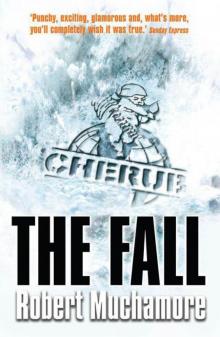 CHERUB: The Fall
CHERUB: The Fall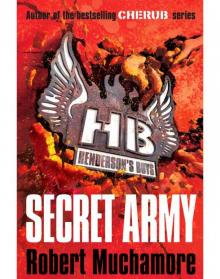 Henderson's Boys: Secret Army
Henderson's Boys: Secret Army CHERUB: Dark Sun
CHERUB: Dark Sun CHERUB: Divine Madness
CHERUB: Divine Madness CHERUB: The General
CHERUB: The General New Guard (CHERUB)
New Guard (CHERUB) CHERUB: Shadow Wave
CHERUB: Shadow Wave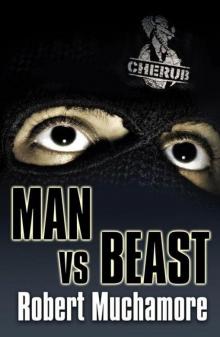 CHERUB: Man vs Beast
CHERUB: Man vs Beast CHERUB: Class A
CHERUB: Class A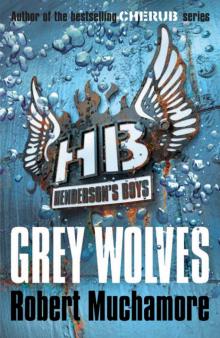 Henderson’s Boys 4: Grey Wolves
Henderson’s Boys 4: Grey Wolves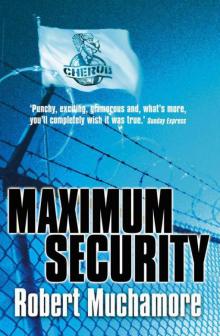 CHERUB: Maximum Security
CHERUB: Maximum Security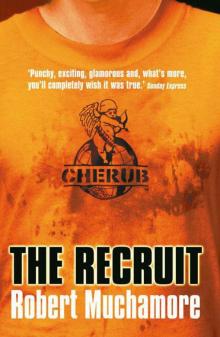 CHERUB: The Recruit
CHERUB: The Recruit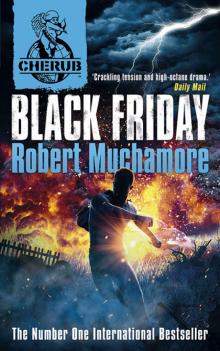 CHERUB: Black Friday
CHERUB: Black Friday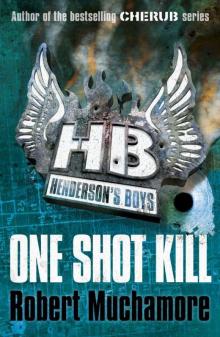 One Shot Kill
One Shot Kill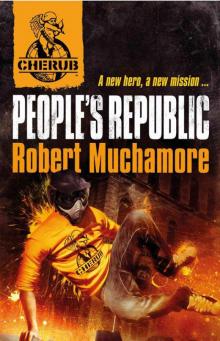 CHERUB: People's Republic
CHERUB: People's Republic